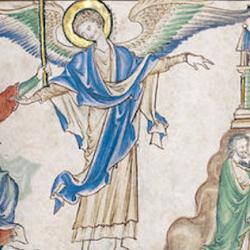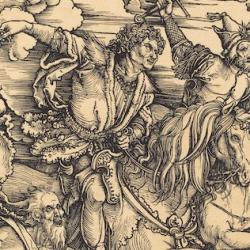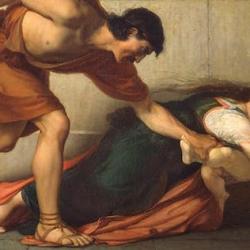Ryan Leif Hansen (Silence and Praise) describes Roman imperial religion as a social contract that bound the gods, the emperor, and the Roman people in a stable, peaceful order: “Cultic ritual, sacrifice, and the related economic exchange were integral for sustaining the order of the cosmos, an order administrated by the gods and Caesar. . . . The sacrificial and economic system functioned like a social contract: the gods sustained the world and the people sacrificed. The continuity of this arrangement functioned to keep the world in this stable condition. . . . The gods were constantly allured with promise of worship for keeping the world in good order, and conversely were threatened with lack of worship and honor when that world order was itself threatened. Sacrifices were promised to the gods if the emperor and his family were kept in good health.”
Sacrifice maintained the order by satisfying the gods on whom Roman order depended. Caesar is a central figure in this sacrificial system, since he is the Pontifex Maximus, the chief priest of Rome as well as the imperial ruler.
Then along came the Christians and upset things, refusing to worship the gods, and thereby beginning to dismantle the Roman political cosmos. In Revelation, “The non-participation or endurance of the saints is envisioned as silence. It brings the Roman cosmology to an end by introducing a break in the cosmological contract between Rome and her gods. Refusing sacrifice is a refusal of the gods who sustain ‘eternal Rome.’ . . . If the Roman world was constructed through cult ritual, image, and exchange, John sought to cancel out the whole system by non-participation. His strategy of non-participation upsets the system and introduces an unsettling anomie. The world in flux that John envisions in the cosmic catastrophes is a way of breaking the cosmic bond between Roman gods, Caesar, and the world constructed through the Roman system of sacrifice.”
This is the background to the song that breaks out after the seventh trumpet sounds (Revelation 11), which describes the Lord’s overcoming of the nations’ opposition: “The rage of the nations against the reign of God is due to the deterioration and breakdown of their world order. Roman cultic discourse had established Rome as the benefactor to both imperial center and margins, but the Christian witness of non-participation threatened this status quo. To refuse sacrifice was to refuse the gods and Caesar, and with them to refuse the world that they caused to be and sustained. The non-participation threatened the whole system of sacrifice to and benefits from the gods, therefore the nations’ rage is directed at God’s coming reign embodied in the Christians’ witness of non-participation.”
Not only do Christians refuse to be participant in the Roman contract, but God’s judgments against Rome undermine confidence in the efficacy of the contract: “John saw the incursion of divine judgment and disaster upon the world as a sort of breach of contract with Rome’s gods. The logic goes something like this: if John’s communities refuse sacrifice, they will be seen as introducing anomie into the Roman social and cosmic order. Then John reports the breaking apart of the world through divine judgment, thus confirming this pagan suspicion. Once the world begins to break apart, the contract with the gods and with Caesar will have been understood to be broken as well.”
As Hansen says, silence (non-participation) and praise (to God, rather than the beast) strikes at the foundations of a Roman order built on idolatrous sacrifice.















